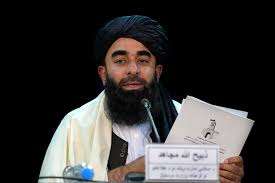The UN special rapporteur for Afghanistan has labeled the human rights situation in Afghanistan as dire and painted a grim picture of civil liberties in Taliban-ruled Afghanistan, criticizing the cleric regime for widespread torture and discrimination against women and minorities. While presenting the half-yearly human rights report at the 55th session of the Human Rights Council, the UN Special Rapporteur Richard Bennett emphasized prioritizing human rights, particularly women’s rights, in engagement with the Taliban. Bennett condemned the Taliban’s discriminatory actions against Afghan women and stressed the importance of prioritizing the Afghan people and ensuring their inclusion in decision-making processes in the country.
The UN human rights report on Afghanistan was widely expected by the global community on the eve of half yearly session of the UN Human Rights Council in Geneva. As human rights situation continues to deteriorate causing unacceptable suffering for the people of Afghanistan. The country witnessed continued depression, especially among the youth, women, and girls, and increased pressure on ethnic and religious minorities in Afghanistan particularly target killings of the Hazara community by Daesh was widely reported around the globe. Meanwhile, institutionalized gender-based discrimination including the imposition of women’s dress code, a ban on women’s work in certain fields, and barring of girls’ higher education in the country attracted worldwide condemnation, whilst, accusations of gender apartheid were also leveled by some sections of the global community against Taliban.
At the same time, the globally proscribed terror outfits found a haven and flourished in Taliban-ruled Afghanistan wherein extra-judicial killings, public executions, and corporal punishments along with discrimination against political opponents remained a persistent issue in Afghanistan. Interestingly, the Islamic Emirate was also conscious of the UN Special Rapporteur’s report and the Afghan Spokesperson categorically called on Richard Bennett to consider peculiar Afghan culture, religious rituals, and ground realities in that country which altogether diverged from Western social ethics, women’s dress code, law and order issues in those nations.
The dilemma of human rights and political wrangling between the Islamic Emirate and its Western contenders continuously grapple with the Afghan public adding to glaring economic and humanitarian crises that are exacerbated due to the denial of economic, social, and cultural rights of Afghans not only by the Afghan interim rulers but the global community who always linked its humanitarians’ assistance with political issues in Afghanistan.
The global community not only reduced its humanitarian aid to Afghanistan but shortcut its diplomatic engagement and civic work with the IEA over a wide range of contentious issues including no fulfillment of the Doha accord, political inclusiveness, and alleged human rights violations in that country. During the recent Doha conference on Afghanistan, there was a consensus among the participants to engage with the Afghan government to overcome mutual issues as the policy of disassociation did not work satisfactorily.
Unfortunately, before the global community initiated its civic work, Mr. Bennett echoed his opposition urging the international community not to move toward normalization of relations with the Afghan de facto authorities until there is no significant improvement in human rights, including the situation of women and girls in Afghanistan.
Presently, a wide range of differences exist between the Afghan rulers and the global community on diverse issues that are conversely adding to the sufferings common public and seriously affecting development and civic work in Afghanistan while reducing the scope for cooperation on shared interests concerning terrorism, regional security, and global peace at the broader level.
Dialogue, negotiation, and cooperation are the only pathways to secure collective goals. Neither the global community nor the Islamic Emirate can achieve their agendas without employing some degree of tolerance in their approaches to reach common ground. So, over 43 million Afghans do not suffer from this political rivalry anymore.







